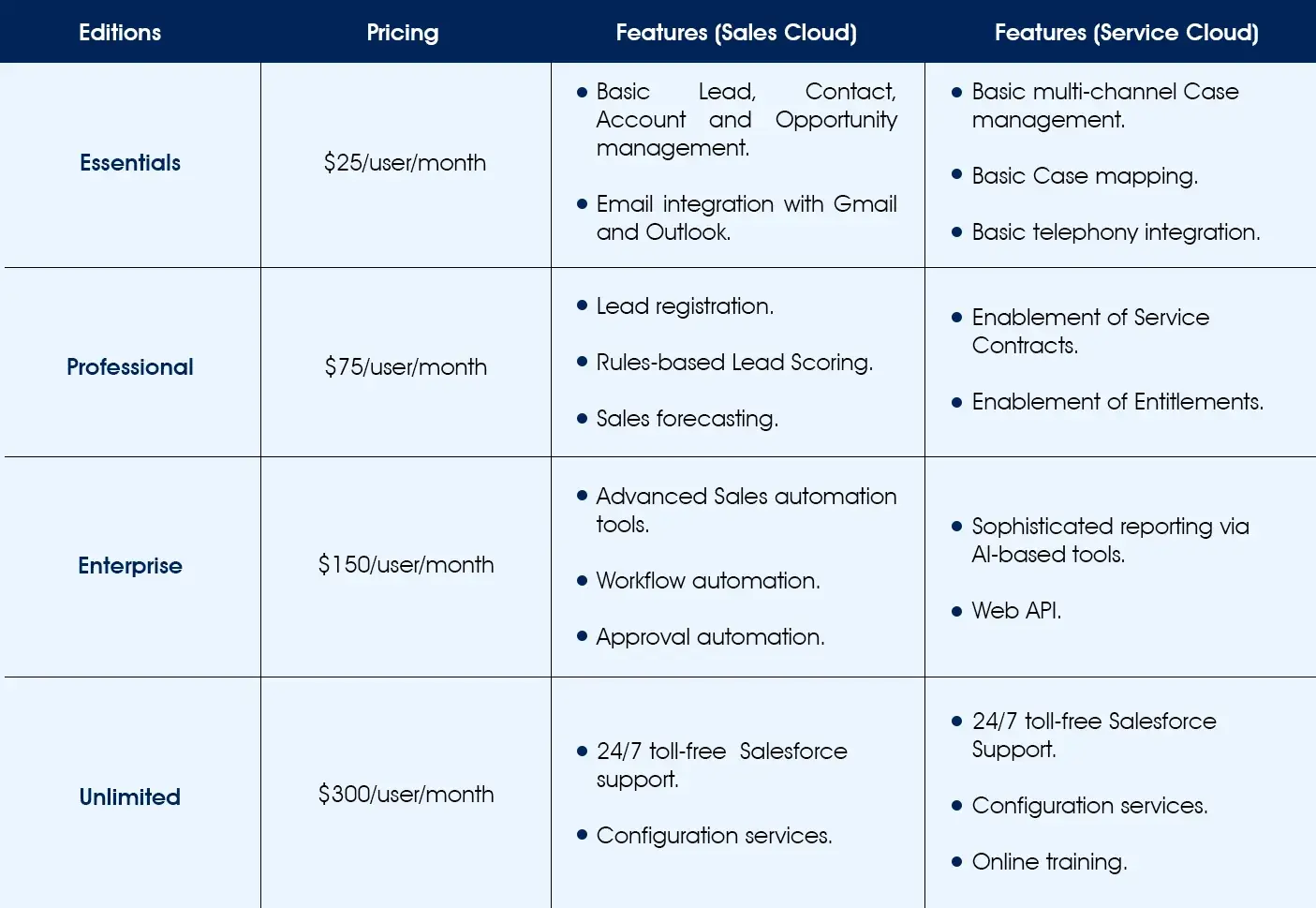Salesforce Sales Cloud vs Salesforce Service Cloud
Table of Contents
CRM (Customer Relationship Management) has already become unavoidable in keeping the business well-organized and flourishing. When you have already onboarded Salesforce as your prime Customer Relationship Management software, it will bring many fringe benefits to your business through its two prime products: Sales Cloud and Service Cloud.
Though these two clouds share generic similarities, what makes them different is their functional and distinctive features. Salesforce Sales Cloud and Salesforce Service Cloud are highly capable of handling different business issues. Things will start tangling when the decision-making time comes. Getting a solution with all the essential features is as important as maintaining the budget.
To help you identify which cloud is best for your business needs, we have this comparison guide for you – Salesforce Sales Cloud vs Salesforce Service Cloud.
→ Click here to download our free guide to Salesforce Sales Cloud Implementation [Download Now].
Salesforce Sales Cloud and Salesforce Service Cloud: What’s the difference
Though, they both serve different purposes yet, there are some genetic differences based on different factors:
| Basis of Difference | Salesforce Sales Cloud | Salesforce Service Cloud |
| Function | Sales Cloud boosts the process of Sales in an organization and maintains various affected parties such as leads, contacts, accounts, customers, quotes, etc. | Service Cloud assists businesses in streamlining and optimizing customer support and services. Important key factors are accounts, contacts, cases, call center, public knowledge base, etc.. |
| Purpose | Its main purpose is to guide the sales team in nurturing leads in a better way and improving the sales numbers. | Its prime objective is to effectively and efficiently deal with the client’s request and provide the required services. |
| Who are the users? | Salesforce Sales Cloud is specially designed for the Sales team, including Sales Managers and Sales representatives. | Salesforce Service Cloud is designed for the Service & Support team that comprises Client Service Managers, Service Agents, or Support Representatives. |
| Tool for Customer Management | Sales Cloud manages prospects and customer-related information with Lead Management and Account & Contact Management. | Service Cloud takes care of all essential customer data on Service Console. It offers a comprehensive view of client & Account information, every raised case, its history, and present status on a single screen. |
| Channel of Interaction | Sales Cloud only offers Email support for establishing and maintaining communication with Leads and Customers. | Service Cloud has Customer Service that integrates all social media platforms and enables support representatives to answer customer queries from one place. Further, the mode of interaction is extended in the form of Chat Services, Phone calls, and Self-Service communities. |
| Analytics | Reports & Dashboards are there to provide Sales reps with real-time progress they are making in their sales process. Also, this feature shows at which specific point they are lagging and what steps they can take to improve it. | Service Analytics provides Service Managers with a holistic view of both KPIs (Key Performance Indicators) for deployed Service Agents. Managers can access customer data, including history, trends, and comparisons to peers. |
| Automation | Users can implement automation in Sales Cloud and create a point-to-click interface in business processes like building automated workflows and alerts for several deals. The system keeps auto-assigning you with tasks as you progress in the deal. | Service Process Automation helps Service Managers automate email notifications, auto-field updates, and case assignments through Process Builder, Apex Triggers, and Workflow rules. This collaborates in increasing productivity and decreases the scope of errors. |
Salesforce Sales Cloud vs Salesforce Service Cloud: License & Pricing Comparison
The pricing of Salesforce Sales Cloud and Salesforce Service Cloud is similar, but what differentiates them is the features each of them is getting along with.

Salesforce Sales + Service Cloud Package
If your business has a full-fledged Sales and Dedicated Customer Support & Service Department, then Salesforce Sales + Service Cloud Package will be your best investment solution. It might seem a little expensive, but just by paying $25 extra for each user license, you can power up your business with Sales and Service Cloud’s features.

This solution, which brings everything together, maybe a good choice for companies that prioritize consistency in their operations and want to use a single database for sales and customer service.
Do you need Salesforce Sales Cloud or Salesforce Service Cloud or Both?
Whether you need Salesforce Sales Cloud, Salesforce Service Cloud, or both, depends on the specific needs of your business.
If your main focus is on sales, Salesforce Sales Cloud may be the better option for you. It is designed to help sales teams track leads, opportunities, and customer interactions, automate sales processes, manage leads and opportunities, forecast sales, and gain visibility into sales performance.
If your main focus is customer service and support, Salesforce Service Cloud may be your better option. It is designed to help customer service, and support teams manage and track customer inquiries, cases, and interactions, automate service processes, and gain visibility into customer service performance.

However, if you want a complete customer-centric experience across the entire customer journey, it’s better to use both Salesforce Sales Cloud and Salesforce Service Cloud. This integration allows sales and customer service teams to access the same customer information and history, enabling them to work together more efficiently. Salesforce offers a bundle called Salesforce Sales+Service Cloud that includes both Sales Cloud and Service Cloud so that you can use both products in one package.
Wrapping Up!
In conclusion, Salesforce Sales Cloud and Salesforce Service Cloud are powerful CRM platforms designed to help businesses manage and track customer interactions and data throughout the customer lifecycle. Salesforce Sales Cloud is primarily geared towards managing the sales process, while Salesforce Service Cloud is geared towards managing customer service and support.
Both products can be integrated to provide a customer-centric experience across the entire customer journey. Regardless of the size and model of the business, organizations can always rely on Salesforce’s Customer Relationship Management system for driving high-quality sales and industry-grade customer services.
Before investing in a cloud service for your business, it’s important to determine which one best fits your needs. One option to consider is working with a Salesforce Certified Partner like Cyntexa. Their team has experience delivering Sales Cloud and Service Cloud as well as Salesforce Implementation Services projects that have helped customers increase revenue and improve customer service.


Don’t Worry, We Got You Covered!
Get The Expert curated eGuide straight to your inbox and get going with the Salesforce Excellence.
Frequently Asked Questions
Salesforce Sales Cloud focuses on the sales process, while Salesforce Service Cloud focuses on customer service and support. Sales Cloud is geared towards managing leads, opportunities, and sales forecasts, whereas Service Cloud is geared towards managing customer inquiries and cases.
Yes, Salesforce Sales Cloud and Salesforce Service Cloud can be integrated to provide a complete customer-centric experience across the entire customer journey. This integration allows sales and customer service teams to access the same customer information and history, enabling them to work together more efficiently.
It depends on the specific needs of your business. Salesforce Sales Cloud may be the better option if your main focus is on sales. If your main focus is on customer service and support, Salesforce Service Cloud may be the better option. Additionally, you can use both also.
Salesforce Sales Cloud and Salesforce Service Cloud are separate products. However, they can be integrated to provide a customer-centric experience across the customer journey. Salesforce offers a bundle called Salesforce Sales+Service Cloud that includes both Sales Cloud and Service Cloud so that you can use both products in one package. With this bundle, sales and customer service teams can access the same customer information and history, enabling them to work together more efficiently.









